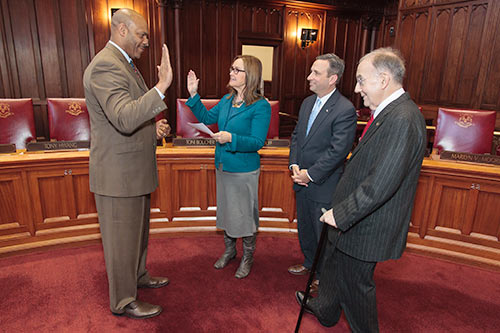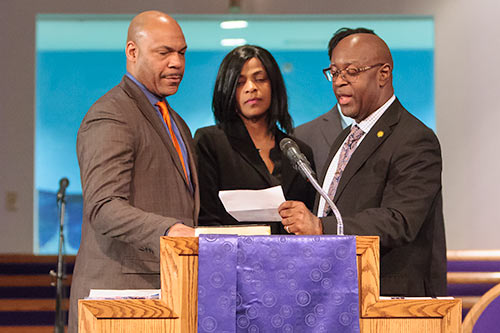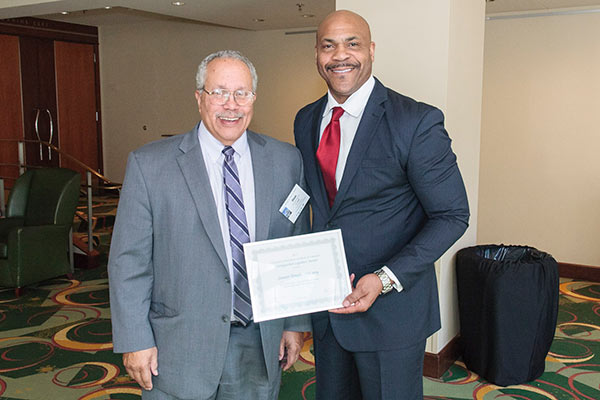Sen. Looney’s Tax Reform Package Aims at Making Connecticut More Competitive and Affordable
Senate President Pro Tempore Martin M. Looney (D-New Haven) today submitted testimony to the General Assembly’s Finance, Revenue and Bonding Committee on his package of bills aimed at making Connecticut’s tax code more competitive with surrounding states, increasing Connecticut’s attractiveness as a place to retire, relieving small businesses from an administratively burdensome tax, and providing Connecticut’s cities and towns with long-awaited options for revenue diversification.
The legislative package of tax reforms introduced by Senator Looney includes:
Below is a copy of Senator Looney’s prepared testimony:
Good afternoon Senator Fonfara, Senator Frantz, Representative Rojas, Representative Davis and members of the Finance, Revenue & Bonding Committee. I come before you today in support of four pieces of legislation that will establish important and much-needed reforms to our state tax system.
Collectively, these bills will help make our tax code more competitive with surrounding states, increase Connecticut’s attractiveness as a place to retire, relieve small businesses from an administratively burdensome tax, and provide our towns with long-awaited options for revenue diversification.
S.B. 5, An Act Increasing the Estate Tax Exemption
It is important for Connecticut to maintain competitive tax rates relative to other states across the country. According to the Tax Foundation, 31 states have no estate or inheritance tax. Of the 19 other states that do, many are clustered in the Northeast—including all of New England except New Hampshire, and also including New York, New Jersey, Maryland and Delaware.
So we are in good company, regionally, in maintaining a tax on estates. Yet we can and should do more to make our estate tax the most competitive in the region. Among the Northeastern states mentioned above, Connecticut already has the lowest maximum estate tax rate at 12 percent. We can further enhance our competitive position by adopting the new estate tax exemption levels put forth in Senate Bill 5.
The federal estate tax exemption level for 2017 is set at $5.49 million—a figure which is automatically adjusted for inflation every year. Senate Bill 5 proposes to gradually bring Connecticut’s estate tax exemption level up from its current $2 million level to match the federal threshold, thereafter also adjusting with inflation to keep on pace. The bill proposes increasing our $2 million threshold to $3 million in 2018, $4 million in 2019 and finally to match the federal level in 2020.
Taking this action would bring our estate tax exemption to the highest level of all our neighboring states, making Connecticut an even more attractive place to the high-income taxpayers who constitute such an important portion of our overall revenue base. I was pleased to see Governor Malloy offer an essentially identical proposal on estate tax reform in his proposed budget, and I urge the Committee to adopt these measures as your important work on the budget progresses.
S.B. 6, An Act Exempting Social Security Income From the Personal Income Tax
Continuing on a theme of making our state’s tax rates more competitive, I also urge you to adopt Senate Bill 6, which would exempt all Social Security income from Connecticut’s personal income tax, for all taxpayers. As of 2014, 36 of the fifty states already do not tax Social Security income.
Connecticut does exempt most Social Security income from taxation today, recognizing the benefit that this provides to the state’s senior citizens on fixed incomes. Our current exemption level is based on a taxpayer’s federal adjusted gross income (AGI). For instance, a married taxpayer filing jointly with federal AGI of less than $60,000 may deduct 100 percent of their federally taxable Social Security benefits. All other Connecticut taxpayers, of all incomes, may deduct 75 percent of their federal taxable Social Security benefits.
We are already very close a full tax exemption for Social Security benefits, and now is the time to join the majority of other states and end Social Security taxation entirely. Doing so would cost the state approximately $46 million in lost revenue, but this is only about 0.3 percent of total General Fund tax revenues.
Eliminating taxation of Social Security income in Connecticut would make our state a much more attractive place to retire, helping our senior citizens to continue living in our state, near their families and loved ones, and enjoying the first-class quality of life that makes Connecticut such a great place to live for people of all ages.
S.B. 7, An Act Concerning Property Tax Relief for Businesses
In 2015 the bipartisan State Tax Panel met to consider a variety of reforms to Connecticut’s tax code. One of their final recommendations concerns the business personal property tax, and Senate Bill 7 seeks to implement that recommendation.
Connecticut’s towns now impose a property tax on tangible personal property owned by businesses. The tax is assessed at a mill rate equivalent to the mill rate on real property in each town, and is applied against 70 percent of the depreciated value of taxable assets.
Personal property is valued using the historical purchase price less depreciation for age. Businesses are required to self-report their property in an annual declaration of their owned or leased personal property grouped into 17 different categories, a reporting process that can prove rather time-consuming, particularly for small businesses. Valuation follows standardized depreciation schedules for each category, most with a 30 percent residual value regardless of age.
Senate Bill 7 would exempt the first $10,000 of a business’s tangible personal property from the business personal property tax, and provide administrative relief for small businesses by exempting those with less than $10,000 of personal property from the burden of itemizing their taxable personal property items.
The Tax Panel found that doing so would exempt 46 percent of all Connecticut businesses from this tax and its administrative burdens entirely, and at cost of only $18 million statewide in lost revenue to municipal governments.
It makes no sense for government to collect a tax that raises such a small amount of revenue while requiring such a great amount of administrative time and effort on the part of our small businesses. I urge the committee to pass Senate Bill 7 and provide relief for the small businesses of our state from this nuisance tax.
S.B. 8, An Act Authorizing Municipalities to Levy a Local Sales Tax
Last but not least, I would like to speak for a moment about municipal aid and the relationship between the State of Connecticut and our 169 towns. Everyone on this Committee and indeed in this legislature knows the importance of state aid to towns in balancing municipal budgets. It is also well known that, given the state’s fiscal position, we must reexamine the financial relationship between the state and our towns this year.
Our solution to this problem will surely be multifaceted, and it must create stability, predictability and increased flexibility for municipal governments going forward. I believe that a part of that solution must include revenue diversification for our towns.
I was a proud supporter of this Committee’s work two years ago to institute Municipal Revenue Sharing of a dedicated portion of the state’s sales tax receipts. Those funds have since become an essential source of revenue for our towns, and therefore must and will be preserved. But the time has now come to take a step further.
Throughout the entire history of Connecticut, municipalities have been permitted to directly raise local revenues only through a single source: the property tax. This restriction is unique to the New England region, a legacy of our shared history dating back to colonial times. Yet in today’s world, this old-fashioned practice places our state at a real disadvantage. With no options other than state aid for addressing municipal needs, our towns have been forced to rely solely on the property tax for the locally derived portion of their subsistence. The unfortunate result is some of the highest property taxes in the nation.
Senate Bill 8 proposes something radical for Connecticut but very common in other parts of the country—allowing municipalities to, at their individual discretion, levy a local sales tax.
For administrative purposes only, and to save towns the expense of hiring new collections staff, this tax would be collected by the state, but its revenues would belong entirely to the towns that choose to impose it. Senate Bill 8 proposes allowing towns to lay a local sales tax of up to 0.5 percent, which would be entirely separate from the existing state sales tax. Were all towns to impose the full 0.5 percent, the Office of Fiscal Analysis estimates they would collectively raise approximately $214.5 million in local sales tax revenue.
Yet the goal of this proposal is not to grow the size of municipal government, but rather to enable our towns to diversify their local revenue base. I believe that our towns truly need this additional revenue flexibility, so they can diversify their revenue structures and ultimately reduce their reliance on the regressive property tax.
We can and must change the legacy colonial property tax system that ties the hands of our towns. Municipalities have long been asking the state for revenue diversification, and this General Assembly can make it a reality this year. Doing so will help to make our state and its towns both more competitive, and more equitable.
Thank you very much for your time, and for your attention to these important issues.


